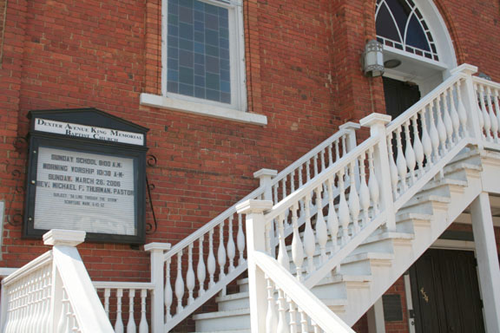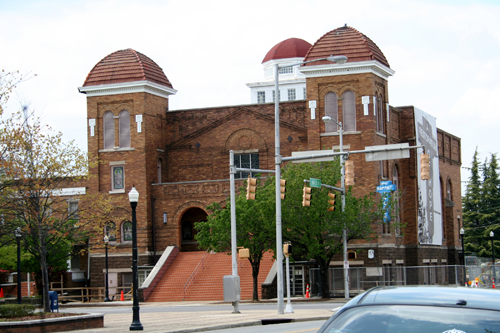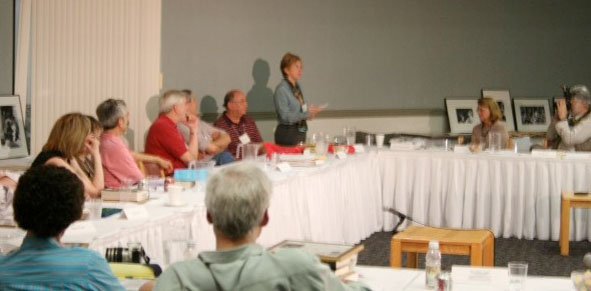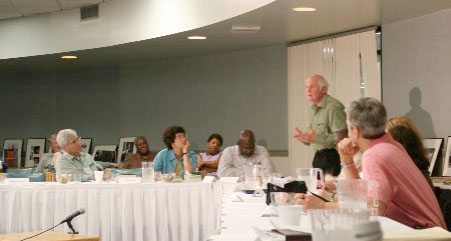Southern Courier
The Southern Courier was a Civil Rights newspaper founded in 1965 in Montgomery, Alabama, by a handful of graduates from the Harvard School of Law. It was funded by the Ford Foundation with the goal of accurately reporting news which was not being reported accurately, or at all, by the mainstream presses in Alabama. The paper ran until 1968 at which time Martin Luther King, Jr., submitted an article for the front page. Although this paper existed for only a few years, it played an important role in the Civil Rights Movement. The articles were scrupulously researched. Not only was the paper accurate, but it helped to inspire those working to peacefully bring about integration. On this page, articles from the paper will be featured, along with commentary by Joan Clark Tornow who served as the Birmingham, Alabama, reporter from January 1967 through March 1967.
 Dexter Ave Church in Montgomery, Ala., where Martin Luther King, Jr., first served as a minister.
Dexter Ave Church in Montgomery, Ala., where Martin Luther King, Jr., first served as a minister.
 The 16th Street Baptist Church in Birmingham, Alabama, served as a rallying point for Civil Rights organizing and protests. In 1963, the Ku Klux Klan exploded dynamite here, killing four young girls who were attending Sunday school. Shortly after this, President Lyndon B. Johnson passed the 1964 Civil Rights Act.
The 16th Street Baptist Church in Birmingham, Alabama, served as a rallying point for Civil Rights organizing and protests. In 1963, the Ku Klux Klan exploded dynamite here, killing four young girls who were attending Sunday school. Shortly after this, President Lyndon B. Johnson passed the 1964 Civil Rights Act.
The Southern Courier Reunion of 2006
The Southern Courier staff and reporters met in Montgomery, Alabama, for a reunion in April, 2006. This was their first reunion -- some 40 years after the newspaper had been discontinued. We had a great time catching up on each other's current lives, and sharing memories of our tumultuous time together in the 60s. We reaffirmed our lifetime commitment to advancing civil rights.
At one round-table discussion, in which we recalled and discussed our reporting in the 60s, I was invited to deliver a speech called, "Memory's Jagged Edge: Reflections on Birmingham, 1967." This was essentially a sermon I had given in August 2005, at the Saltwater Unitarian Church in Des Moines, Washington. In Unitarian Churches, it is customary for several members of the congregation to write and deliver sermons during the summer months when Unitarian ministers typically take time off for personal renewal and study. Because my experience as a reporter for the Southern Courier had been life-changing, I chose to write my sermon about that.
 Joan Tornow delivering her sermon/essay at the Southern Courier Reunion, Montgomery, April, 2006
Joan Tornow delivering her sermon/essay at the Southern Courier Reunion, Montgomery, April, 2006
 Keynote speaker, Taylor Branch
Keynote speaker, Taylor Branch
A highlight of our Southern Courier Reunion in Montgomery was keynote speaker, Taylor Branch. He is a Pulitzer-Prize winning historian who has written a trilogy about the Civil Rights Movement. He was currently touring to promote the trilogy's third and final book, At Canaan's Edge: America in the King Years, 1965-68. The first two books were Parting the Waters: America in The King Years 1954-63. (Winner of the Pulitzer Prize) and Pillar of Fire: America in the King Years 1963-65.
For a great video about this conference, click below:
https://www.youtube.com/watch?v=khaYuddKB7U
Read Joan’s essay on this topic:
Memory’s Jagged Edge: Reflections on Birmingham, 1967
Joan Clark Tornow, Ph.D.
August 14, 2005
Birmingham, Alabama. The city in the deep South that in 1963 Martin Luther King, Jr. referred to as “probably the most thoroughly segregated city in the United States.”
At two separate times in my life, I lived in Birmingham. The first time was from 1958 to 1962 when I was a high school student there. The second time was five years after that when, in 1967, I returned for three months to join the civil rights movement.
I’m going to begin by touching on some of my high school memories and then move on to the more sobering time when I returned as a civil rights worker.
In 1958, our family of six was happily ensconced in Yellow Springs, Ohio, where my father was a professor of biochemistry at Antioch College. Rather suddenly his research agenda led to work at the University of Alabama Medical Center, and before you could say Ulysses S. Grant, we found ourselves living in Birmingham.
Fitting into Southern culture was hard.
The schools, like everything else, were still segregated which felt strange to my sisters and me. And we were dismayed to see that the things we had heard about Alabama – things we could scarcely believe – were true. Things like the ‘white only’ signs over the drinking fountains and the segregated theaters and swimming pools.
My high school was huge. Academically, it was not bad. But the social hierarchy was complex and intimidating. I struggled to find my niche and soon fell in with a band of misfits. How can I describe this group?
We were a band – um – a band of – Well, we were a band. The band. The Shades Valley High School Marching Band. Scorned by the popular kids, we didn’t care. We had each other. And we had music.
By my third year, as a high school junior, my need to conform had abated. And in 1960, I decided to wear something really taboo: a presidential campaign button for John F. Kennedy. Certain members of the band – pretty much the entire horn section as I recall – distanced themselves from me immediately. My woodwind buddies gave me the benefit of the doubt until Kennedy was inaugurated, at which time their loyalty flagged – as if JFK was all MY fault. And I couldn’t even vote! Eventually even the percussion section –at the relatively liberal end of the marching band’s political spectrum – well they reluctantly came to the conclusion that I, shall I say, marched to a different drummer.
As soon as I graduated, I did exactly what my older sister had done before me and what my younger sister would do after me – I hopped on a Greyhound bus back to Ohio and to Antioch. Little did I know that I would again have to negotiate cultural differences because, by then, I had inadvertently acquired a Southern accent and a southern short & curly haircut. I of course set about growing my hair long again and replacing “y’all” with “you guys.”
Thank goodness time can heal. With the perspective of time and age, we can often laugh – laugh until the tears of anguish truly become tears of joy -- joy that we have survived long enough to understand and be understood.
But some memories never lead to laughter and never should. These are often memories that keep tugging on us as if they have more to say. These memories don’t offer up humor, but they redeem us in other ways. They continue to grow in our subconscious, to shape us, to make us change agents in ways we may not even consciously discern.
I’m about to share such a memory with you now, and this is from the second time that I lived in Birmingham. But first --some historical context. I left for college in 1962, and it was the following year that efforts to integrate Birmingham lunch counters and schools became very serious. Martin Luther King, Jr., was jailed in April of 1963, and it was then that he wrote his famous Letter from the Birmingham Jail. This included the familiar passage, “We are caught in an inescapable network of mutuality, tied in a single garment of destiny. Whatever affects one directly affects all indirectly. Never again can we afford to live with the narrow, provincial ‘outside agitator’ idea.” With respect to demonstrations, Dr. King said that the city’s white power structure left the Negro community “no alternative.”
On September 10, President Kennedy federalized the National Guard to insure the peaceful integration of two schools in Birmingham. Five days later, on September 15, 1963, the 16th Street Baptist Church was bombed and four young girls were killed. Two months after that, November, 1963, John Kennedy was assassinated.
In January of 1967, during my senior year of college, I returned to Birmingham as a reporter for the Southern Courier, a civil rights newspaper established in Montgomery, Alabama, by a handful of Harvard Law School graduates with support from the Ford Foundation. I wanted to help, and being the Birmingham reporter for this newspaper seemed to be a start. I’m now going to tell you my story of that time.
Not many white people had crossed the threshold into this black funeral home in Birmingham. Not in 1967. But here we were, two white women, investigating what we believed to be a murder. The funeral for 18-year-old James Small would be the following day, so today the funeral home was empty but for the two of us, the friendly black proprietor, and James Small who lay on the embalming table under a white sheet.
The proprietor knew why we were here. We needed to ascertain the location of the bullet that killed James Small, son of a black political activist.
The white woman at my side, Missy, was twice my age and a Birmingham native. Raised to be an elitist Southern lady, she had rebelled against her own culture. She still dressed in pastel suits and had every blond hair in place. Yet here she was, traipsing around with a Yankee, investigating the murder of a black man. A hate crime committed by the police.
The day before, I had read a one-inch report buried in the back pages of the Birmingham News. A black man had been spotted running near a school where, in the past, break-ins had been reported. The police yelled stop and then fired a warning shot into the air. Later they found his body. That was how the Birmingham News reported it.
Missy and I were now looking at the body of James Small lying on a steel table. We were struck by his stature. Though only 18, he was tall, perhaps six feet tall, and had an athletic build. Clearly he had been in the prime of his life. The proprietor pulled down the sheet so we could see that the bullet had not entered his chest. He tipped James over on his side and we could see that the bullet had entered his back. The warning shot. The one that had allegedly been fired into the air.
Missy and I looked at the proprietor and all three of us shook our heads in disbelief and sorrow. Dr. King had said in his Letter from the Birmingham Jail that in any nonviolent campaign the first step is the collection of facts. So now we had established the fact of the fatal bullet. We expressed our concern and appreciation to the proprietor and stepped back outside into the harsh February sunlight which stung our eyes. I had seen a corpse for the first time, and it was the corpse of a young person whose death made no sense.
Earlier that morning, I had gone to the police station to request the official report. While waiting for a clerk to retrieve the file from a back room, I adopted a nonchalant attitude in front of the police officer in charge. Another officer, on other business, strode into the building, the door slamming behind him. His hand was bandaged.
“What happened to you?” asked a policeman who was milling about -- quickly adding in jocular tones, “Didn’t I tell you never to hit a Negro in the head?!” But he didn’t say “Negro.” The officers – all white, of course -- laughed. A black couple sat waiting for something, keeping their eyes lowered.
“What business is this matter to you, little lady?” the officer in charge now asked. Perhaps he originally thought I was an intern from the Birmingham News. Maybe by now, he had noticed my long straight “hippy” hair – a sure sign of a “Yankee agitator” -- or the way I had glowered at the comment about the officer’s bandaged hand. I revealed that I was a reporter for the Southern Courier, and fortunately he didn’t appear to have heard of it. He handed me the report, and I read that Officer R.G. Haltom fired “To apprehend a fleeing felon.” Hmm. Not exactly how it was reported in the Birmingham News. I wondered just where the cover-up had begun.
After my visit to the police station that morning, I arranged a visit with James’ mother and sister. This is when I enlisted the help of Missy, an activist from the Unitarian Church who knew her way around every part of Birmingham. Now Missy and I sat in the Small’s living room where grief hung heavily in the air. Charlena, the sister, said that James had gotten home late after a date and the two of them were talking late into the night. Maybe some of you can remember how absorbing it was, at that age, to talk hour after hour, into the night, constructing dreams for the future or solving the world’s problems. Around 1:30, they ran out of cigarettes and Charlena convinced James to go buy some from a machine at a nearby gas station. When James did not return promptly, Charlena eventually fell asleep on the sofa.
Early the next morning, Mrs. Small said she was awakened by a phone call.
“Do you have a son named James Small?”
“Yes, sir.”
“Well, you better come get him ‘cause he’s in the morgue.” Mrs. Small sat there now on her sofa, weeping as Charlena tried to comfort her. Charlena then told us that when they went to identify the body, they were handed James’ effects – simply his hat, his wallet, and a fresh unopened pack of cigarettes. They learned that James was killed just two blocks from his home.
Later that day, I filed my report with the Southern Courier and it was soon front page news in that Montgomery-based newspaper.
A few evenings later, I was invited by the Smalls to the Jackson Street Baptist Church where Reverend Fred Shuttlesworth, head of the city chapter of the Southern Christian Leadership Conference, was leading a meeting. I sat next to Mrs. Small and Charlena, and we watched as all the pews filled up, and the overflow crowd found places to stand in the aisles and doorways. Then Reverend Shuttlesworth spoke. “Every time you turn around, some Negro’s being killed by some trigger happy policeman in Birmingham,” he said. Indeed, there had been 14 killings in 12 months. Almost everyone there had heard about the killing of James Small, but Reverend Shuttlesworth felt it important for the Smalls to speak of this most recent senseless tragedy. Mrs. Small and her daughter were too overcome with grief to speak, so they signaled for me to tell their story.
I had never spoken before a crowd. During college, I had occasionally raised my hand to speak in class, but my pounding heart always led me to pull my hand back down before I was called upon. I’m still more comfortable working behind the scenes, and while some of you know that I’m seldom at a loss for words – you must concede that I rarely speak unless I’m in a small group.
I was stunned by the responsibility that suddenly lay before me. But the hunger for truth in that room was palpable, and it emboldened me. And something about that pack of cigarettes spoke to me of a humble and tragic truth that I must tell. So I stood up and made my way to the pulpit. Compared with what others in that room had stepped up to do when it was their turn, I really can’t say this took courage. I was not likely to be arrested and beaten. I was not putting the lives of my family in danger. I was not going to be knocked over by fire hoses or bitten by snarling German shepherds. I was not going to be shot in the back some night by police who claimed I was resisting arrest or running from a potential break-in. I was not going to awaken in terror some night and find a burning cross in my yard. No, what was required of me that night was not really courage. But it was dedication -- dedication to an ideal and to the people with whom I shared this small moment in history. So I calmed my pounding heart and told the story of James Small. That was 38 years ago, and I have not spoken from a pulpit since. And now here I am again, and I’m telling the same story.
This memory is still at work in me – yes, even after all these years. It keeps reminding me how important it is to determine the truth, to speak the truth, and if possible, to publish the truth. It reminds me of how important it is to remain dedicated to the dream of Martin Luther King – to live in true respectful community with others.
I’ve come to see that we can all participate in this process of working toward a just society, no matter how powerless we may feel at times. Yet, so many times we hold back. We’re afraid of making waves and rocking the boat. But when you’ve seen, up close and personal, what oppressed people have done. How they have risked not just popularity and approval, not just an awkward moment -- but their livelihoods and their very lives – well, it’s humbling to say the least.
About a month after this event in Birmingham, I took a train back to Ohio and completed my degree. A year later, in 1968, Martin Luther King, Jr., was assassinated. My friends, family, and I had not yet recovered from John Kennedy’s assassination, and now another idolized leader had been cut down. It seemed that the earth rocked beneath our feet. And when Bobby Kennedy was shot two months later, we were simply numb.
Around this time, I moved to New York City for graduate school and never returned to that Southern city of red clay. Not physically.
Heroclitus said that you can never step in the same river twice, and memory is like that, too. Each time you summon up a memory, you are filtering it through a mind that has changed. I do not believe that everything that happens to us is for a purpose – some pre-designed lesson plan. What I do believe is that, over time, our experiences and memories give us opportunities to discover new questions and new perspectives. And I find that new wonderings about my experience in Birmingham keep cropping up.
For example -- I wonder if Mrs. Small lay in bed that night listening to James and Charlena talking in the living room. The house was so small, she must have at least heard their voices. I wonder if she was filled with hope that this movement, this civil rights movement led by Martin Luther King, would create a better world for James and Charlena, and that she was perhaps playing some small part in that movement. I wonder if she drifted off to sleep before she could hear the door close behind her son, James.
I wonder if Mrs. Small and Charlena retreated, in fear, to the sidelines of the movement, or did they march with new determination?
And what really happened that fateful night?
Although I was a curious person then, I am even more curious now.
I wonder if the man who phoned Mrs. Small ever regretted his cruelty, his total lack of compassion. At the time, I knew this man’s choice of words was horrific, but I had not yet experienced the fierce love every mother has for her children and how helpless we feel when we cannot be there to protect them.
Sometimes someone will ask me, “Do you think anything has really changed in Birmingham?” And my answer is Yes. Although Birmingham still has a ways to go, not unlike other cities, there is compelling evidence of positive change. In 2003 the African-American Mayor appointed Annetta Watts Nunn as Chief of Police. She is the first woman to hold that post, and the second African-American. And incidentally, she graduated from the University of Alabama – segregated until the 60s. She was eight years old when James Small was shot. Maybe she even overheard talk of it at the time.
I learned from that intense time in Birmingham that when you align yourself with a movement, you can’t predict how your role will evolve. You truly are caught up in something bigger than yourself, and while you maintain your values, you may not be able to maintain your comfort zone.
I saw, in no uncertain terms, what is involved in changing social systems, and I acquired a deep respect, even awe, for Martin Luther King, Jr., and the power of nonviolent protest.
I learned that when certain stories are published, even in small newspapers, they fight the despair. I learned that Southern ladies named Missy, in pastel suits, just might be social activists. And, as I stand here at a pulpit for the second time in my life, giving voice to this story once again, I remember the words of Eleanor Roosevelt who said, “You must do the thing you think you cannot do.”
THANK YOU.
CLOSING WORDS:
May we remember the words of Martin Luther King, Jr., who said, “I believe that unarmed truth and unconditional love will have the final word in reality.” And may we be encouraged by each other as we move outside our comfort zone and do things we thought we couldn’t do. Go in love, go in joy, go in peace. Amen.
Return to The Southern Courier Archives

